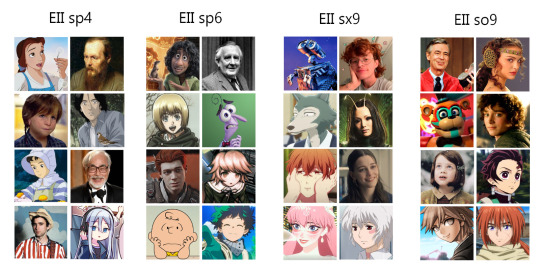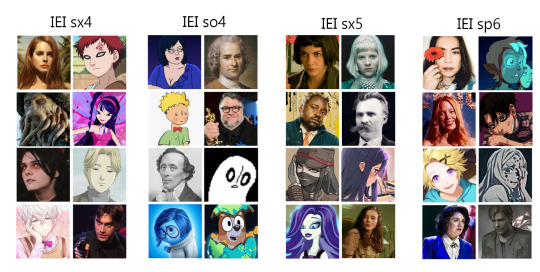#EII
Text
Sociotype Profiles — EII
Ego
Leading Fi
Central to the EII are their personal sentiments or attitudes towards the people and events surrounding them and the demands of their conscience. The EII is in a persistent state of subjective evaluation, trying to assess how they feel. They tend to form attitudes based on their personal ideals of 'goodness' and then strive to act sincerely to these sentiments. When applied to behaviours and actions, this provides them with strong ideals of what is ‘decent’ of a person, and they tend to hold themselves to nearly quixotic standards. Often they may feel a sense of disappointment with their own actions, not living up to their potential. When applied to people, this promotes social selectivity, with EIIs being motivated to form close, meaningful and stable bonds with those they feel to be of a desirable character and avoiding those they feel to have bad intentions. EIIs tend towards idealism and may be reluctant to form their deepest, closest connections with just anyone. Instead they will keep most people as friendly acquaintances and spend much time waiting for the special person who would be right for a romantic relationship, occasionally waiting so long as to not commit to anyone at all. In each case, they create the appropriate psychological distance with each individual according to their inner compass, sharing themselves completely and honestly with those they feel close to, while being more reserved and distant with those they are less sure of.
Creative Ne
As an aid to their leading function, EIIs like to keep an open mind to the numerous possibilities. In tandem with their main approach of assessing the inner character of others, this provides a sense of ‘good faith judgement’. Instead of judging someone on their superficial actions or deeds, the EII tries to get a grasp of a person’s potential to be good, where they have room for growth. In this way, they are able to largely see the best in others and indirectly draw that goodness out of those they care for. For this reason, they are less likely to cut off their relations with others if they have had a bad experience, tentatively and indefinitely delaying character judgement until they are sure of the person's potential. In the same way, EIIs are open to new ideas and may enjoy a wide range of eclectic and even quirky interests, often being open to the potential these areas offer to improve their lives. However, this also results in a non-committal nature of EIIs, who prefer to try out a range of different experiences and walks of life, rather than commit themselves to a particular path and cut out alternatives. This can result in a meandering or wandering effect, the EII drifting between different activities and phases, trying things out but not staying long in any one thing.
Super-Ego
Vulnerable Se
Although greatly aware of their personal attitudes and sentiments, EIIs largely lack the ability or the desire to assert their will and enforce their judgements on others. This is the anathema to their accepting, chance-giving nature, where in an attempt to see the potential good in others and explore desirable characters, a forceful imposition of one's own attitude onto someone may be a failure to respect the humanity of the individual and the possibility they may be misunderstood. Despite often becoming the voice of personal conscience in a community, they are naturally too naive to the competitive battle of wills to effectively fight and resist others. Frequently, they may misunderstand threats in their environment, not knowing when their disappointment with the conduct of another person, or very personal reaction to an upsetting stimulus might lead to an argument or fight, often resulting in their criticism of a situation getting them into trouble and having to remove themselves from the suddenly and unexpectedly aggressive vicinity. They do not understand power play and may naively expect the best of others, failing to notice the realistic pressures and forces that make a person act less than their ideal. Often sensitive souls, they will likely feel vulnerable and strained in their physical surroundings, easily becoming overwhelmed when they feel someone is invading their personal space or acting boisterously and feeling attacked when no harm was intended. EIIs can quickly tire of anything requiring decisiveness in the present, tensing up when demands are placed on them to suddenly respond to a real, immediate threat or crisis and will do all they can to stay out of conflicts. At the same time, they tend to be entirely oblivious to the fact that they may come across to others as overly weak and delicate. Only on matters of conscience might they make a stand, usually to their defeat.
Role Ti
Despite being disposed to sentimental judgements, EIIs are aware that being more objective is required in certain situations. As such, the EII attempts, and mostly succeeds, to be more logical, being able to structure and organise their ideas reasonably well and provide clear analytical reasoning when needed. They also are capable of thinking impartially and coming to fair, unbiased judgements. However, such tendencies are attempted inconsistently as the EII much prefers the subjective, more sentimental approach, determining what feels ‘good’ rather than merely technically correct. Usually they will apply logical analysis and breaking concepts down into parts when they are looking at something of personal meaning to them and are trying to convey their ideas to others. However, doing so for protracted periods can be intellectually tiring. Instead, the EII longs to be shown the processes and practical steps for how things actually work, so that they do not have to structure their understanding in theory. The EII is tolerant of order and regularity in their lives and is usually comfortable with compliance as long as they feel the rules are in place for the right reasons and interpret them as guidelines of safety, rather than coercive dictations. However, they will quickly become the voice of conscience when they personally feel that the law is oppressive, cruel or wrong.
Super-Id
Mobilizing Si
The delicacy of EIIs can result in a certain amount of hypersensitivity to their surroundings, with slight changes in the environment easily throwing them off centre. This results in a strong desire of the EII to maintain peace and stability in their lives. As such, EIIs actively try to keep their surroundings and relationships with others relaxing and anodyne, preferring quiet, quaint backgrounds. In reducing their surroundings to the pleasant and painless, EIIs feel that they can have some hold on their present reality and keep the harsher forces and pressures at bay. Similarly, EIIs are often attracted to environments of picturesque beauty and seek out such tranquil surroundings for work and leisure. EIIs may take personal pride in the performance of a task requiring attention to fine-detail and working with their hands, especially if the task is of some special meaning to them and allows the opportunity for EIIs to attain high quality in their work. In such activities, the idealistic perfectionism so common to EIIs can find a cathartic release and many EIIs make their closest friendships with people they meet during such pastimes. Furthermore, EIIs can become quite health-conscious and fussy about their close friends and relations not looking after themselves properly, taking it upon themselves to provide for them. For the sake of their feelings, the EII needs stability, and they do their best to not allow disharmony to throw off their calm. At the same time, they lack an instinct for their own survival and might end up unknowingly walking into danger despite their attempts for everything to be safe and secure.
Suggestive Te
EIIs naturally associate human decency with the will to do practical good in the world, but are largely lacking in practical skills. Often they have little awareness of how efficiently they are performing a particular task and can easily waste their time and energy. Consequently, EIIs often worry about failure and incompetence, internally punishing themselves for not being good enough. To aid this difficulty, EIIs can be diligent learners, trying to read up on helpful information that can enable them to do a better job. They desire to be helpful around others, less clumsy and more capable of handling daily matters well. Despite this, they can lack the ability to estimate the helpfulness or relevance of information they read and the methods they carry out, and tend to indiscriminately accept the information they come across unless they get a feeling the person or source is dishonest. For this reason, they greatly appreciate finding a trustworthy, reliable friend with the pragmatic expertise to help them in these areas and will respond very positively to someone taking the time to patiently explain how something works to them. In such situations, they will feel great wonder at the steady stream of practical information and its improvement of their daily lives. EIIs will treat such knowledgeable people as the go-to expert and will readily rely on their assistance in handling the practical challenges of the day-to-day.
Id
Ignoring Fe
The EII is largely resistant and distrustful of attempts to alter or affect their emotions. When someone tries to persuade them of something with an emotive performance, their natural instinct is think such attempts as being insincere and deserving of their silent scepticism. Indeed, these approaches can often lead to them forming a personal opinion that is contrary to the crowd. A quiet, gentle individualism is common to EIIs who often refrain from identifying with any particular group, neither wanting to commit nor to belong to a circle of people they feel no personal connection with. In group situations, EIIs may feel a clash between their conscience and the general mood. When such an occasion arises, the EII is likely to quietly leave the gathering of people, preserving their inner dignity without stirring up a fuss. In interaction with others, the EII is unlikely to be emotionally expressive with strangers, instead opting for a cordial civility and preferring to keep any strong feelings to themselves and only confiding later in someone they feel close to. When upset by others, EIIs are unlikely to express negativity to the surroundings, although they may openly express their worries if they feel something bad is about to happen to those they care about. Despite, their usual reserve, warmth is freely expressed to those they feel personally comfortable with and often looser, more playful emotions can make themselves known.
Demonstrative Ni
EIIs are naturally very reflective individuals who spend a lot of time in their heads, thinking about the long term consequences of their actions. Usually, they are able to get a sense of where events are likely to go with little concrete evidence, and tend to be aware of fatalistic outcomes. Despite this, EIIs are disposed towards keeping open possibilities rather than closing them, just in case they may be wrong and have misunderstood. To judge too quickly and close a window never to be opened again would be undesirable. Instead of deciding to cut people off for not being part of an intended plan, EIIs are more likely to be non-committal, and allow themselves to drift away from things that disappoint them or no longer hold their interest, with every intention of giving someone another chance should things change. In their primary concern of relationships, EIIs will be most likely to apply their long-term focus to knowing where a relationship is likely to go and using this to advise their choices on who specifically to focus on out of many fish in the sea. In this way, they readily idealise a desired relationship and can be picky over who might fit that idealism, despite giving plenty of people a chance to live up to that ideal. Once they have a particular person to focus on, EIIs will move on to their greater priority, i.e. the intimate exploration of everything there is to know or experience about an individual's character. In this way, EIIs are able to go deep for the purpose of greater exploratory breadth.
Source: Wikisocion
20 notes
·
View notes
Text


⋆。°✩EII & IEI + Enneagram Subtypes⋆。°✩
Names under the cut
EII sp4:
Belle (Beauty and the Beast)
Fyodor Dostoevsky (Writer)
August "Auggie" Pullman (Wonder)
Dr. Kenzo Tenma (Monster)
Taeko Okajima (Omoide Poroporo)
Hayao Miyazaki (Movie Director)
Sufjan Stevens (Singer)
Kanade Yoishaku (Project Sekai Colorful Stage)
EII sp6:
Bruno Madrigal (Encanto)
J.R.R. Tolkien (Writer)
Armin Arlert (Shingeki no Kyojin)
Fear (Inside Out)
Cal Kestis (Star Wars: Jedi Fallen Order)
Chihiro Fujisaki (Danganronpa)
Charlie Brown (Peanuts)
Izuku "Deku" Midoriya (Boku no Hiro Akademia)
EII sx9
Wall-e (Wall-e)
Robbie Daniel Skinner "Cavetown" (Singer)
Legoshi (Beastars)
Mantis (Marvel Cinematic Universe)
Mafuyu Sato (Given)
Eleanor Crain (The Haunting of Hill House)
Suzu Naito "Belle" (Ryu to Sobakasu no Hime)
Shion (no.6)
EII so9:
Fred Rogers (Television Host)
Padmé Amidala (Star Wars Prequels)
Glamrock Freddy (Five Nights at Freddy's: Security Breach)
Frodo Baggins (Lord of the Rings)
Lucy Pevensie (Narnia Chronicles)
Tanjiro Kamado (Kimetsu no Yaiba)
Makoto Naegi (Danganronpa)
Kenshin Himura (Rurouni Kenshin)
IEI sx4:
Lana del Rey (Singer)
Gaara (Naruto)
Davy Jones (Pirates of the Caribbean)
Musa (Winx Club)
Gerard Way (Singer)
Johan Liebert (Monster)
Searan Choi (Mystic Messenger)
Jason "J.D." Dean (Heathers the Musical)
IEI so4:
Diane Nguyen (Bojack Horseman)
Jean-Jacques Rousseau (Writer)
The Little Prince (The Little Prince)
Guillermo del Toro (Movie Director)
Hans Christian Andersen (Writer)
Napstablook (Undertale)
Sadness (Inside Out)
Bingo Heeler (Bluey)
IEI sx5:
Amélie Poulain (Le Fabuleux destin d'Amélie Poulain)
Aurora Aksnes "AURORA" (Singer)
Lemon (Bullet Train)
Friedrich Wilhelm Nietzsche (Philosopher)
Korekiyo Shinguji (Danganronpa)
Yuri (Doki Doki Literature Club)
Spectra Wondergeist (Monster High)
Elsa Korr (Jojo Rabbit)
IEI sp6:
Mitski Miyawaki (Singer)
Raine Whispers (The Owl House)
Carrie White (Carrie)
Yoon Bum (Killing Stalking)
Yoosung Kim (Mystic Messenger)
Spider Demon Mother (Kimetsu no Yaiba)
Veronica Sawyer (Heathers the Musical)
James Sunderland (Silent Hill 2)
#personality typology#socionics#enneagram#EII#IEI#enneagram subtypes#sp4#so4#sx4#sp6#sx9#so9#phew this took a lot of work but it was worth it
18 notes
·
View notes
Text

LOG ENTRY #14: PERSONAL NOTE: THAT CUNT!!!!
I love eii I keep making my dnd campaigns about her and the one time I tried to not make it heavily about her the campaign exploded and to salvage it. I made it about her. she's a 2 foot dynamite bitch and I love her so much
5 notes
·
View notes
Note
What does socionics EII with INFJ type like?
The way you phrased this is a little bit vague, there's multiple ways i could interpret this, so i'll try to answer those i can think of. i'm really sorry if this isn't what you meant, please feel free to elaborate😓
Are EII and INFJ compatible?
Yes and no, it's a little complicated. Socionics and mbti both stem from the same theory, jungian. mbti is very simplified while socionics is expanded by a multitude of different authors. There is nothing contradictory in EII and INFJ alone, however, counting in jungian, which needs to correspond directly to both, it's a bit odd. Socionics stays true to Jungs ir/rationality, making the alternative name for EII INFJ, though its base function is Fi (rational/judging function), like INFP in mbti (in which the p stands for perceiving, or irrationality in jungian). Myers Briggs messed up on that department (as many more). overall IEI INFJ or EII INFP would work better, but it depends on how serious you are about typology, imo this isn't a criminal contradiction and on its own it works fine.
What is the archetype of EII INFJ?
Considering EII infj is kind of odd already, there's no real archetype, but I think the most ‘obvious’ (i don't know how else to call it, common?) typology would be so469 ELVF. sp6 LEFV works as well, LEVF (in case of so4).
What are typical behaviour/traits of EII INFJs?
As I mentioned, mbti is lacking in a lot of departments, including this one. Gifts differing is super surface level and it's pretty much the only official source. I also mentioned how socionics is much more expansive, so if you want to look into traits and behaviour i would recommend reading further up on that! For this I'll recommend another account, as they have far more info than I'm able and willing to write out right now, let alone coherently. @2lwetdog on tiktok has really great videos on socionics, and I highly highly recommend them! Do remember that the way you act doesn't necessarily mean you’re one type or another, especially jungian typology, which mostly focuses on the mental aspects. Of course if nothing is remotely similar to you, it might be time to look into other options, but not everything about this particular aspect has to be exactly like you.
8 notes
·
View notes
Text
some socionics types as ai generated images
i'm very impressed by this midjourney thing i must say. what is it? a discord server where chat bot generate images for you when you use command. for example "/imagine octopus faced flying giraffe" anyhow, some of the results honestly surprised me! (but then again, i feed it the right keywords, ahem.)
alright INFJ/IEI first

i like the second and third the most here. in this one, keywords were "introverted patient smiling graceful mystical woman"... because of the keyword smile though, results are overly positive but let me be positive with infjs once, lol.
then ENFJ/EIE:

here, i like the 2nd and 4th the best. 1 could be estp and 3 could be infj.
now INTP/LII

these came out surrealistic for some reason but i like the 3rd and 4th anyways. keywords were "eccentric introverted curious indulgent cerebral woman"
ENFP/IEE:

i liked all of these. keywords were " quirky smiling empathetic energetic woman"
ISFJ/SEI:

keywords here were "amiable coquettish sweet introverted woman"
INFP/EII:

these came out perfect because as an infp expert i knew exactly what keywords to use: "delicate wholesome empathetic innocent noble magical woman".
and finally my own type ENTP! this was my first:

2nd and 3rd one here directly intp. 1st one seems esfp but 4th is not very far. keywords were "eccentric extraverted irreverent curious wisecrack indulgent woman" then i tried again:

DAMN SON! hahaha. i actually and realistically found the first pic very entp compatible. but the "irrational" keyword i added made things caricature-like. i guess entp ones didn't quite work out like others because i didn't add enough intellectualism based keywords and eccentric just made things introverted or something.
but yeah, that was fun!
#intp#infp#eii#iei#eie#socionics#personality types#16 types#entp#ile#jungian typology#infj#enfj#enfp#isfj#mbti#ai generated#midjourney
24 notes
·
View notes
Text
"Sometimes I feel like an unreliable witness to my own life."
- irl quote by INFj
Blind spot Se causes them to have that absent, floating away characteristic in their presence.
Socionics EII
MBTI INFP
2 notes
·
View notes
Text




He wanted me sadder.
2 notes
·
View notes
Text
Self improvement for infps, eiis
“Your strength lies in a deep understanding of people's values and relationships. You are interested in the motives of actions, personal and soulful qualities of others, their relations, which you can spend a lot of time watching and analyzing. After prolonged study and observation, you come closer to defining a person's character: who she really is and not how she presents herself.
The ultimate goal of your words and actions is creation of a positive, harmonious atmosphere in which others can develop their talents. You are good at comforting and mediating. You prefer not to focus on the negative actions, faults, flaws and wrongdoings of others. Instead you try to make them think about the moral foundation of their actions, the moral values of their lives, and exert influence on their conscience.
The main problem that worries you is your lack of resoluteness and assertiveness, inability to make demands of others in direct and willful form. There is a measure of caution and timidity that is inherent to your approach to some extent. You are emotionally sensitive to others and don't want to seem obtrusive.
You are prudent, undemanding, modest and cooperative. When you have been challenged, you don't always respond right away but prefer to conceal your grievances. You can protect those who are close to you, but don't readily do engage in this. You think that your offender needs to realize her mistakes and repent. If she does not, you avoid having contact with her.
A recommendation for you: develop your ability to defend yourself, directly express your grievances, do not show mercy towards those who take advantage of you and did not repent, don't allow yourself to be used for anyone's personal gain. Learn to say "no". Empathize less with strangers and pay more attention to people who are close to you.
Another one of your problems: careful and overly meticulous analysis of any issue, topics, or task down to the last detail, which slows you down and decreases your effectiveness. You may get bogged down by minor details of life and of your work. Then you hardly find time for rest and recreational activities in the company of your friends, which can negatively affect your health. You thoroughly and deeply analyze everything about a topic or issue that concerns you. The results of such an analysis are not always satisfactory, due to which you can feel sad and demotivated. You feel depressed by anything that goes beyond the scope of harmonious personal values and good human relations.
Don't be misled by your pity, as to not later feel ashamed of your actions and words and reprimand yourself in retrospect. Remember that true justice does not allow for compromises with conscience.
Accelerate the pace of your productive activities, focus your attention such that it slips by minor details and stops only on the main parts and the essentials. Try to teach yourself speed reading - it will help you learn to see the overall picture of the phenomenon or event. When analyzing a subject or particular field, don't strive to disambiguate and clarify everything. Strive to see the general picture. Knowledge of general norms and rules will relieve you from unnecessary waste of nerves and efforts on aspects that are of little consequence or interest to anyone.”
#infp#infp personality#eii#socionics#mbti infp#mbti self improvement#self improvement#enfj#infp x enfp#infp life
92 notes
·
View notes
Text
ISFJ RLOAI possible?
So apparently I'm an ISFJ and in SLOAN, Im a RLOAI (r|L|oaI) and it's definitely pretty strange to have high openness as a sensory type and in socionics Im an EII[Fi], which i've seen before ISFJs identifying with that type but not sure.
here's my full typology if you need it: ISFJ IS(F) 9w1 sx/so 952 EII[Fi] r|L|oaI LEVF Phleg-San
Kind of a push with intuition but well it is true I have interest in more intuitive topics like philosophy, psychology, etc..
7 notes
·
View notes
Text
Socionics Quadras — Delta
Delta, or the ‘fourth’ quadra, includes LSE, EII, IEE, and SLI.
Reinin caracterises this quadra as Judicious, Serious, and Aristocratic.
Dominant elements
The dominant IM elements of the Delta Quadra are Te, Fi, Ne, Si. Grouping together the elements of the Ego blocks of the Delta Quadra types, we get a picture of what aspects of life Delta Quadra types strive to bring to the forefront of life, as well as the kind of group atmosphere and lifestyle they pursue.
Te blocked with Si
Delta types make a point of talking about the rationale behind their actions and emphasizing the productiveness or unproductiveness of different ways of doing things - even in such emotional areas as personal relationships.
Delta types value peaceful, refreshing activities where they are doing something useful and balancing out their inner world at the same time.
Delta types have the philosophy that they will have to rely on their own industriousness to achieve their goals rather than on luck, speculation, group effort, or strong leadership.
Ne blocked with Fi
Delta types love to share personal experience mixed with their own sentiments regarding their experiences, but all in an insightful and non-dramatic manner.
Delta types like to talk about new beginnings, opportunities for personal growth, and their plans and prospects for the future.
Subdued elements
The subdued IM elements of the Delta Quadra are Fe, Ti, Se, Ni. Grouping together the elements of the Super-Ego blocks of the Delta Quadra types, we get a picture of what aspects of life Delta types strive to keep hidden, avoid, not focus attention on, and keep at the periphery of their lives.
Fe blocked with Ni
Delta types rarely display their deep passions and vision, preferring instead to talk in more neutral terms about what they want to do and why.
Delta types reject dramatism and emotional affect in favor of wry humor and understatement.
Delta types don’t tend to form or maintain groups based on fun, emotional interaction, but only take groups seriously that perform some common productive or restful activity.
Delta types generally dislike using poetic wording when describing their inner state, but talk simply about what they feel or their bodily sensations.
Se blocked with Ti
Delta types do not fare well in high-pressure situations where they are being forced to do things, are facing threatening opponents, or are submitted to rigorous discipline, but wear out quickly and look for a more peaceful and welcoming environment.
Group behavior
Groups made up of primarily Delta types tend to be focused on working on projects, enjoying physical recreation, or finding out interesting things about each other. Laughter is usually subdued and brief; instead, people smile a lot and try to be witty and welcoming. Groups need to be focused on some specific productive activity or topic of discussion, or else they fall apart. In Delta groups, there is a lot of splintering and decentralization. This allows for more focused and productive interaction with only those who share your particular interests or sentiments. People jump from small group to small group easily to keep up their interest level. No one demands that the entire group listen to one person or that everyone do the same thing. Delta Quadra types believe that if everyone just pursues their own interests and makes some accommodations for others, the group will be better off anyway. Delta Quadra types do not focusing on building group identity or unity of purpose, but prefer for the group to remain splintered and decentralized.
Romance styles
Delta romantic relationships usually begin simply as the encounter of two individuals interested in a relationship and each other in a particular moment, with very little in terms of outward demonstrations of “romance” in the “wooing” sense of the term or in strong external demonstrations of emotions. Deltas are more focused on the present moment than Gammas, and therefore even relationships of very strong attachment do not lead to constant concerns as to their longer-term practical feasibility. Deltas see as optimal romantic relationships those where partners spend time together on fun activities and sharing ideas of potential practical application. Romantic atmospheres are low-key, based on comfort but practicality.
Perception of other quadras
Alpha
Deltas tend to see Alpha types as fun company and interesting people to discuss ideas and prospects with, but naive and inconsistent in their personal and business relationships. Alpha types seem to lack the common sense to turn their fun and creative energy into something productive and often seem overly idealistic.
Beta
Deltas tend to see Beta types as people who “dream big” and always want to turn things into grandiose endeavors, yet can’t manage day-to-day affairs effectively. Also, Beta types seem unwilling to consider things from the point of view of others, which gives them a streak of meanness and cruelty.
Gamma
Deltas tend to see Gamma types as driven and reliable in personal and business relationships, but not sufficiently understanding of people who want to pursue their own individual path in life. Gamma types sometimes become too demanding and can have a streak of vindictiveness or spitefulness which prevents them from being accepting and forgiving.
Source: Wikisocion
#personality theory#personality types#typology#socionics#sociotypes#iee#lse#eii#sli#enfp#estj#infp#istj
20 notes
·
View notes
Text
Reasons Why Belle is Actually an EII and Not an IEI (In My Humble Opinion)

Rational > Irrational
IEIs are usually very tolerant, flexible and change decisions frequently. Meanwhile EIIs are rigid, stubborn and don't like changing their decisions.
You can definitely see the stubborn streak Belle has, in the way she doesn't give Gaston the time of day and how she'd rather starve than eat with Beast.
Romance Style Infantile > Victim:
IEIs are interested in power-play dynamics where their partners aggressively pursue them in an attemp to "conquer" them while they feign resistance, otherwise they'll feel doubt over whenever they're desired by their partners. EIIs are interested in a partner that can take care of them, specially on their physical needs, and in exchange try to show their partners the unexpected and fun side of things.
Belle is definitely the latter, she's not interested in power dynamics or men trying to conquer her. She thanks Beast by playing snowball fights with him, showing him how to feed birds and spending time together reading books she likes. In the song "Something There" Belle sings about how she thought Beast was a brute before but now sees him as someone kind and gentle, which is usually what EIIs look for a partner in a relationship.
Gaston's Relationship Conflictors > Duals
I've seen people argue that an IEI Belle doesn't have to get along with SLE Gaston because duality can only work when both parties are healthy, but that's not how it works.
The thing about duality is that regardless of health levels they bring interesting conversation and dynamics, because they humble each others dominant functions while helping develop their unconscious but valued functions too, actively making each other at least a little bit better.
An unhealthy SLE meeting a healthy IEI is the best thing that could happen to them. IEI Belle would've fixed Gaston. Instead we have to see how Gaston's Fi PoLR can't stand Belle's moral preaching and Belle's Se PoLR can't stand Gaston's aggressive and self-important behavior.
But What About Beast and Belle's Relationship?
I'm going to be really bold in this claim, but I think Belle and Beast's relationship is one of either Duality or Activation.
Many people, myself included, saw Beast's aggressive and controlling behavior as a sign that he used Se but Te, specially when unhealthy, can be just as controlling and aggressive. Beast is not really interested in seeming like a tough and intimidating person, in fact, even when he was unhealthy he showed through body language signs that he regretted the outbursts and scaring Belle away, which is something a Se user would NEVER do.
Beast fulfilled Belle's needs by using his Si to play the role of the caretaker. He learned she liked books so he showed her his library, they passed time sharing food together, gave her a comfortable place to read together and tried ballroom dancing with her.
They both grew as people, Beast showed Belle to be a little more grounded in reality. Belle showed Beast to be more optimistic and taught him that if you love someone you'd do anything to make them happy, even if it means sacrificing yourself.
In the end, Beast let her go, because she taught him how to use Fi.

Edit: I no longer fully believe Beast is a Te and Si user and I'd like to apologize for confusing MBTI Te with socionics Te.
My point about him learning to use Fi from her still stands though, since the message he learned is still about valuing interpersonal bonds and doing the right thing.
6 notes
·
View notes
Text

6 notes
·
View notes
Text
yo, guess what...

i joined NEWGROUNDS
[lmk yours if you're in there, i want more art moots or new artists to follow]
#eii#this place is so good tho#ik im no big artist but it's cool to start again in a place like this#looking for more art moots so do not hesitate on lmk#newgrounds
4 notes
·
View notes
Text
difference between infps, infjs and enfps when it comes to extraverted thinking
INFP policy: i will learn about this person, i will understand from where they are coming AND THEN i will customize my suggestions or advices based on that. i won't use basic recipes, i won't objectivify them which is the direct opposite of te. as a result, they will never order people around without first listening what exactly is the problem and gazillion other factors. they do value te though and they are open to te advices themselves.
ENFPs has te in the third slot. they will say it nicely for sure, but they can totally and easily tell you what to do, using te. (te in that slot is bold and mobilizing in socionics). they take initiative when it comes to making things efficient at workplace without anybody giving them that responsibility, without anyone asking their help. they are te catalysts, they make gears START turning with their energy, they do not fall into analysis paralysis but of course their te is not consistently there. it doesn't have long durability but they use their te psychic reserves in bursts and that's the explanation of catalyst analogy.
INFJs, in comparison to these two would almost totally ignore te and instead use ti to explain you how the system works. for example, an infj would tell you “well, if you do this, x happens and if you do that z happens.” and then they leave the choice to you. they imply though, you obviously need to chose x here.
#infj#infp#enfp#extraverted thinking#introverted thinking#personality types#mbti#socionics#16 types#jungian typology#iei#iee#eii
26 notes
·
View notes



